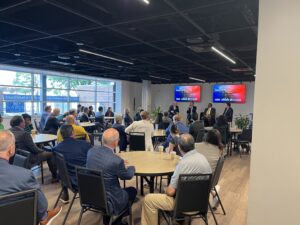Amanda Plecas
Q&A with Dr. Erika Burk, Wacker Senior Director of Human Resources
Wacker’s initial investment in Bradley County, Tenn. began in 2009 with the announcement to purchase land for a new plant. Work began in 2011 and in 2014 Wacker Chemie AG celebrated its 100th birthday.
Later this year, the single largest investment in the company’s history—Wacker Polysilicon North America—is scheduled to begin operations. Predictably, the world’s energy producing sectors will continue to rely on energy sources that include photovoltaics. Because Wacker believes in the continued demand for polysilicon, the Munich-based company estimates the capital expenditures to be some $2.4 billion.
. . .
Q: What are your major accomplishments so far in 2015?
A: This year alone, we conducted well over 2,000 interviews and have hired more than 300 new team members. By the end of February, 100 of those people were on board.
We also started three new apprenticeship programs. We believe this integrated approach will be very effective: students can develop a better understanding of what they learn in class by applying this knowledge in a highly sophisticated work environment.
Q: Can you tell us more about the apprenticeship programs?
A: Students in these programs participate in paid on-the-job training at the Wacker plant in Charleston, Tenn. As an apprentice, students work one or two eight- or 12-hour shifts each week. We provide required books and safety equipment. These apprenticeships align with five-semester existing training programs at Chattanooga State’s Wacker Institute.
Apprentices are not guaranteed a full-time job upon graduation, but graduates of Wacker Institute programs have an edge for open positions.
Q: Have you seen substantial interest in these programs?
A: We’ve had a great response so far. Most of the graduates of the chemical engineering technology program at Chattanooga State Community College have found positions with Wacker or other local companies, and word is getting out about the opportunities for Wacker Institute graduates.
With the possibility of tuition being paid through Tennessee Promise, Tennessee Hope or other scholarships, this can be a great opportunity. Graduates may now enter the workforce with experience obtained at a globally operating chemical company. You can find out more about Wacker Institute programs at chattanoogastate.edu.
Q: You were the first person hired by the company for the new plant in Tennessee. What were some of your first tasks?
A: At the beginning, we put many strategies into place. For one, the Wacker Institute was a recruiting and training strategy to create a pipeline of future chemical operators. It was also an effective way to train the first chemical operators temporarily assigned to Germany for on-the-job training at our Burghausen plant.
We also developed compensation strategies, policies, shift schedules, and all that is necessary to start a new plant. We partnered with our communications department on branding strategies − as a company new to the area, it was important to get out in the community as much as possible. We spoke to civic organizations, community groups and area schools, and we interviewed with local radio stations, television stations and newspapers.
Wacker places a lot of value in HR—it’s significant that Wacker chose HR as the first department to come on board and begin the process with management of setting up this plant in Tennessee.
Q: Can you describe any common misconceptions about your field?
A: Sometimes HR is seen as merely a disciplinary function or the bearer of bad news like Catbert, the evil HR director in the Dilbert series, but that is one huge misconception and not what we practice.
We are a service function helping team members in all things employment related − personnel sourcing and hiring, skill development, benefits administration and employee relations throughout one’s career, retirement or termination.
Sometimes, HR supports managers in disciplinary matters. Unfortunately, these discussions tend to take place in HR so most people identify HR with only these topics. But we facilitate a positive, safe and enjoyable work environment and that is the real essence of human resources.
Q: How do you balance your work and personal life?
A: During the startup phase, most things need to be done yesterday. My rule for my team and for me: if it can be done tomorrow and it’s after hours, do it tomorrow. Hard to follow for Type A personalities like me, but it is the key to work life balance.






